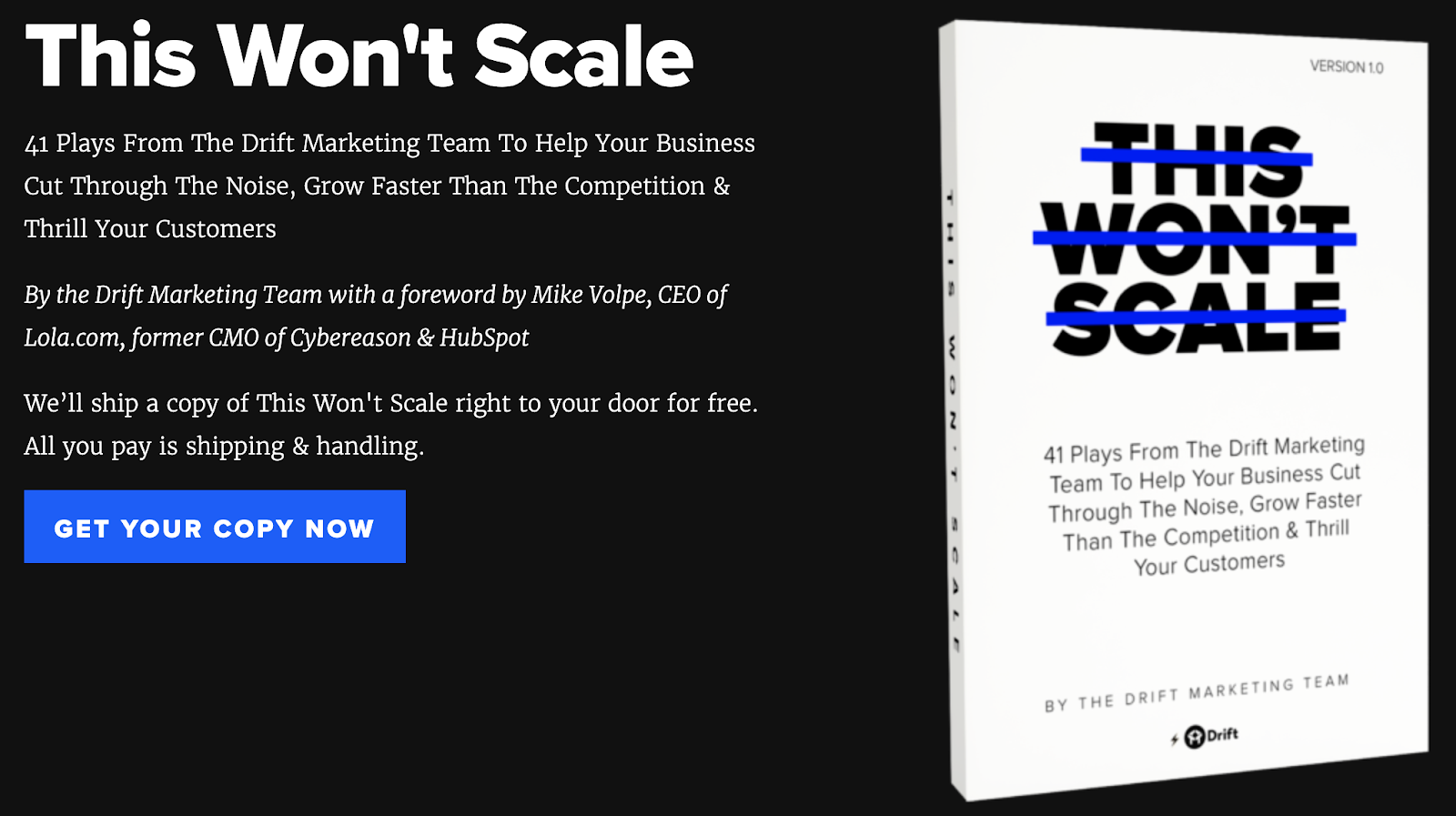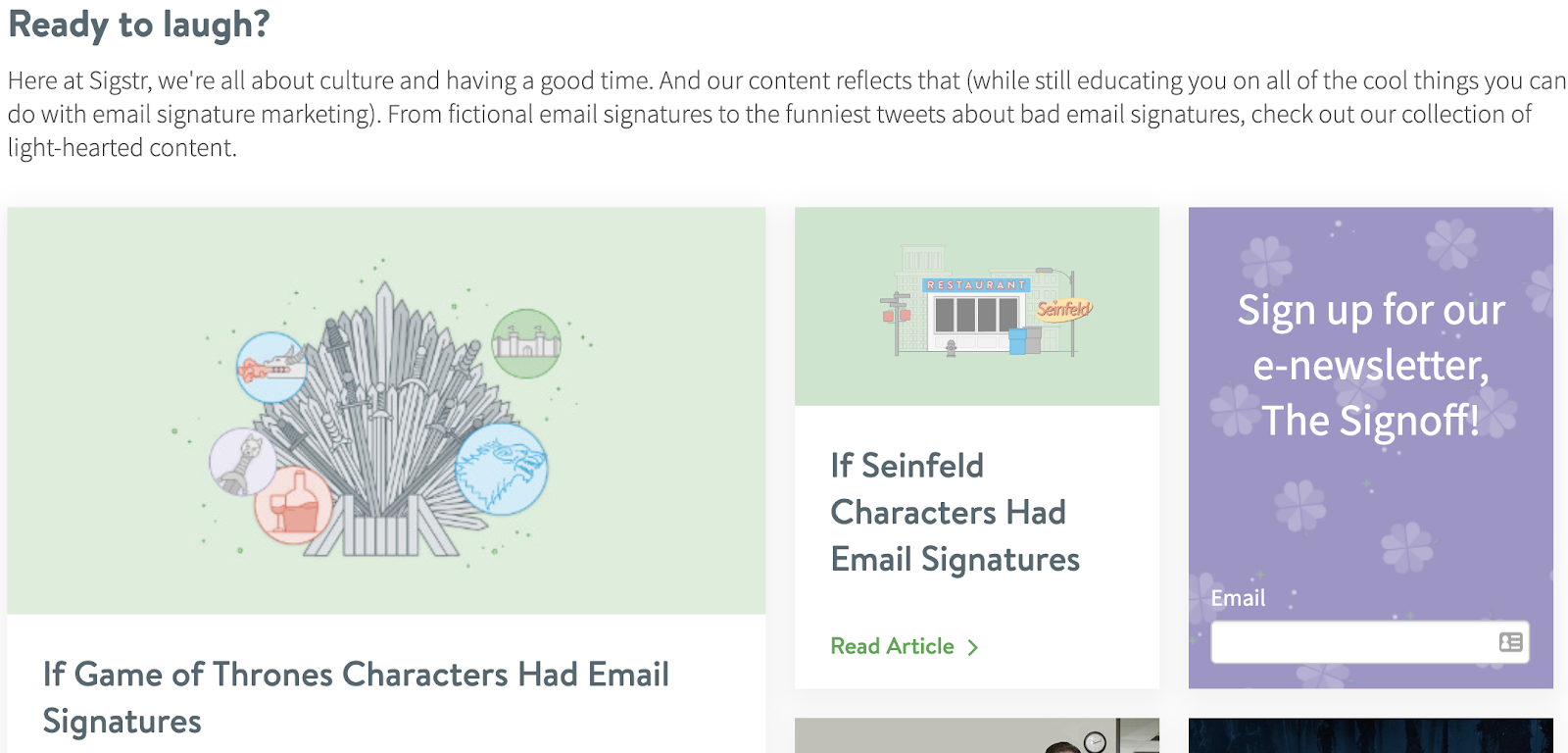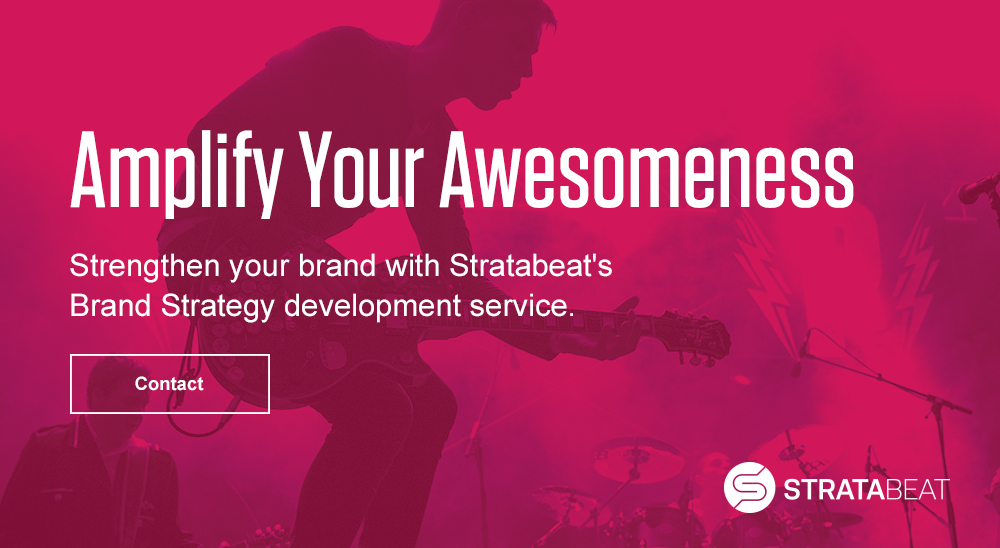Why the Heck Do So Many B2B Brands Lack Personality?

We all have that one friend who has loads of personality. Everything they say is either funny or interesting, and they attract people everywhere they go. Their personality is magnetic and people can’t wait to hang around them.
There are a few B2B brands that also have “loads” of personality. There’s Virtual, which boldly promises to help associations, consortia, and standards organizations “Make Their Mark” on the world and focuses relentlessly on client success. They spark fire in the hearts of executives by inviting them to “reimagine what’s possible”.
Then there’s Drift, who’s VP of Marketing, Dave Gerhardt, posts compelling videos from his phone on LinkedIn, where he riffs about marketing or he talks with experts or he provides recommendations while walking down the street, which often garner over 100,000 views. He’s always 100% authentic and never edits the video footage. The rawness of the video makes his genuineness shine through, and you can’t help but want to invite him over for a beer (or wine or Jack Daniel’s).
Drift also created a book called This Won’t Scale. In an age of shiny, new “marketing hacks” and digital transformation and a societal obsession with efficiency, Drift is busy talking about all the things they do that simply don’t scale – and they wouldn’t have it any other way. The lateral thinking is contagious.
The videos and books have connected them to thousands of additional customers. And you can’t argue with the results, as they have become one of the fastest growing SaaS companies ever.
There’s also Sigstr, who helps customers create custom email signatures that further their marketing efforts. Sigstr loves a good laugh and has gone to great lengths to get their customers to laugh as well.
They’ve created blog posts such as “If Seinfeld Characters Had Email Signatures” and if “Game of Thrones Characters Had Email Signatures”. In fact, they have an entire section of their blog devoted to humorous content.
Each of these companies has loads of personality, which distinctly sets them apart from their competitors.
These companies, however, are the exception.
Because the unfortunate reality is that most B2B businesses have the brand personality of an avocado.
Don’t get us wrong – we love avocados when they’re turned into good guacamole. But with the skin (technically, the “exocarp”) still attached before you have prepped them, they are not quite ready to be devoured.
Most B2B businesses are pretty bland as well. They don’t have any sparkle. They lack zest. There’s nothing that sets them apart from the competition. They may have a clear message and a professional website, but everything is just “meh” when it comes to personality.
Something needs to change.
Why You Need Brand Personality
You may be thinking, why does my business need brand personality?
You need a clear, authentic brand personality because your audience is made up of actual human beings with real feelings and desires. People are attracted to other people with personality, and they’re also attracted to businesses with personality.
Think about it for a second. Do you get excited to hang out with someone who bores you and makes you want to take a nap? No. When you’re talking to someone, do you hope they have zero personality? Of course not. When you call into a customer support line, do you get excited at the thought of being assigned a number and being treated like a cog in a machine? Nope.
Here’s the hard truth…
B2B business is no different than interacting with other people. In fact, that’s precisely what it is. Yes, you’re selling to other businesses, but those businesses are made up of people who are driven by emotions. And when your business has a clear brand personality, magic starts to happen.
Next-Level B2B Branding
You begin to attract customers that you wouldn’t otherwise. You stand out in a crowded marketplace. When you’re competing in a marketplace where so many companies have similar (or even identical) offerings, brand personality starts to become a massive differentiator.
Advantages of Brand Personality
Why exactly is brand personality so powerful? How does it help you attract and retain customers? Why should you seek to create a personality around your brand? Here are three reasons.
1. Emotional Response
Brands with personality evoke emotional responses and are much easier to remember. Think about Nike and their slogan, “Just Do It”. That slogan, which represents their brand personality, evokes an emotional response and is incredibly easy to remember.
B2B businesses benefit in the same way. When they have a strong personality, people will respond emotionally and remember their brand.
2. Loyalty
Why are people so loyal to Dewalt? Because for years they’ve had an unquestioned lifetime return policy. This policy represents and sums up their brand. They represent outstanding customer service and durable, high-quality products. In return, construction companies and commercial contractors are fiercely loyal to the Dewalt brand. They trust Dewalt.
If your business can build brand personality, you can create that same kind of loyalty. People will come to recognize and love your brand, which will, in turn, help you retain customers for years.
On the flip side, if you have no personality, there’s a good chance you’ll lose customers at some point to similar companies who do have personality.
3. Effective Targeting
Developing brand personality helps you much more effectively reach your target market. Nike is seeking to reach people who want to push themselves to the limit. QuickBooks is seeking business owners who want to grow, grow, grow. McKinsey wants to attract only elite executives at large enterprises.
From your messaging to your web design, brand personality can say a lot about who becomes interested in your business. If you have NO brand personality, you attract random leads who may or may not actually be a good fit for your business.
Why Do B2B Businesses Fail At Brand Personality?
If brand personality is so powerful, why do so many brands fail at actually creating a personality? There are numerous reasons.
1. Culture
Brand personality flows out of company culture. You can’t simply tell your employees to be funny or to go over the top when it comes to customer service. Rather, those things need to be woven into the very DNA of the business.
Just look at Buffer. They care about customer service so much that they call their support team the Happiness team – made up of Happiness Heros, Weekend Warriors and Community Champions.
Their company culture is so well established and ingrained into every one of their employees, in fact, that co-founder, Joel, put it to the test in real time. During a presentation on happiness and brand transparency, he told everyone this:
“Actually, I’d love for you guys to experience it yourself. Everyone, if you feel like participating, please take out your cell phone and fire off an email to hello@bufferapp.com.”
Of course everyone in the room – about 500 people – jumped on the opportunity. And then?
“Within 2 minutes, we have about 500 emails in the inbox. They test us by asking non-robot questions, telling jokes, and asking for chocolate chip cookie recipes.
“The 50 Buffer Happiness Heroes online around the world take a sip of their coffees and teas, stretch out their legs in their homes, local coffee shops or parks, or coworking spaces, and jump on the emails.
“On stage, Joel waits. Soon, the hands in the audience start going up as they receive their replies. Within a few minutes, everyone in the audience has their hands up, and smiles on their faces. Some people are laughing to themselves and looking up their Hero on twitter to send a shout out. The guy who wrote in Portuguese thinks to himself how he can’t believe he heard back so quickly, and in his native tongue!”
How were they able to do it? Because customer service is an integral part of the company. Putting the customer first is part of their brand personality and culture.
2. Lack of Leadership
Brand personality tends to flow from the top down. It needs to be created through effective leadership. If a business is going to develop an effective personality, it must first be embraced by the leaders of the business and then pushed down through every level of the business.
Think of Apple and Steve Jobs. Or Ginni Rometty and IBM. Or Salesforce and Marc Benioff. The acts and behavior of leadership become the framework within which others learn to work, communicate, and interact with other team members. When employees see the CEO being fearless and pulling off previously unthinkable stunts, but then also donating millions of dollars to charity, they understand the rules of engagement. When they see leadership talking to everyone with the utmost respect, including the interns and cleaning crew, they learn how to treat others.
3. Lack of Employee Freedom and Empowerment
Once a brand personality has been established, employees need the freedom to act out that personality. Dewalt employees have the freedom to make decisions about how to best exchange items, whether that be to issue a refund or to give store credit.
If every small brand personality decision has to be run by management, there’s simply no way that a business can develop personality.
4. The Business Doesn’t Stand For Something
It’s easier to uncover your brand’s true personality if your business stands for something, for a cause, ideal, or idea. The CRM software company, Dubsado, stands for empowering small business owners to start, run, and grow their business. That ideal has become their personality and has shaped who they are.
In the same way, your business should have a core ideal that drives who you are and gives your personality an anchor.
5. Lack Of Willingness to Be Transparent
Developing a real, authentic personality requires being transparent with your audience. If you never admit your mistakes and aren’t transparent about key decisions, your team will lack the bonds that allow for a brand personality to organically take shape.. They’ll simply see you as a corporation who is playing at being authentic, and the suspicions and skepticism will rot the brand from the inside out..
On the flip side, when you’re genuinely authentic and transparent with your audience, you’ll win loyal fans for life. Social media company Buffer has made transparency such a core value that they’ve even established a “Transparency Board”, in which they share things like salaries and even the big mistakes that they’ve made. Because of this, they’ve attracted thousands of loyal customers.
6. Confusing Fun With Culture
Many B2B companies assume that creating brand personality simply involves buying some foosball tables for employees and encouraging them to have fun. This isn’t brand personality.
Brand personality is all about who you are, what you value, how you behave, how you communicate, how you treat others, and the actions you take.. You can give your employees all the foosball tables in the world and still have a staggeringly boring brand personality.
7. Brand Style and Voice Was Never Documented
To ensure alignment among your employees, document the articulation of your brand personality. Putting pen to paper clarifies who you are and what you stand for as a brand. The clarity helps your people understand expectations, what’s right, and what’s wrong.
Your brand personality is part of your overarching Brand Stack, which includes brand elements such as your core values, tonality, positioning, differentiation, and customer promise. To have a strong brand identity, it’s important that all of this is documented clearly for employees. The alternative is that different team members think quite differently about the brand – as an agency that provides Brand Strategy and Visual Branding services, we see this type of dissonance all the time among prospects.
Develop a Powerful Brand Strategy to 10X Your Growth
8. Poor Communication
In addition to clear documentation regarding brand personality, there must also be clear ongoing communication. Leadership must be ultra clear about the business and how that plays out in day to day actions. Without clear communication, messaging will be confused, as will employees.
9. Unwillingness To Change
An unwillingness to change and adapt your brand as time passes can ultimately lead to the death of your business. Kodak is a prime example of this. For years, they represented the pinnacle of cameras, selling everything from film to disposable cameras to high-end photography gear for studios. They were the camera brand.
But as time passed and digital cameras took over the market, Kodak failed to adapt and ultimately failed to survive.
If your brand personality is going to appeal to customers, you must be willing to change and adapt as time passes. You have to speak the language of your audience, and that language and audience may change as the years go by.
10. The Brand Doesn’t Resonate with The Audience
Your brand personality needs to represent authentically who are you. But ultimately, your brand personality should resonate deeply with your audience.
Your brand personality should attract your ideal customer. You want to build a brand that stands for an ideal which your customers relate to in the way of a friend, or an ally, or a parent, or a teacher, etc.
When crafting your brand, always keep your audience in mind.
11. The Brand Is Built On Logic and Not Emotion
Brand personality thrives on emotion. People connect primarily with emotion and make decisions based on gut instinct. If your brand personality is built on logic – on explaining the features of what you offer – you’ll fail at creating a compelling brand.
On the other hand, if you weave emotion into the core of your brand, you’ll resonate on a deep, instinctual level with your customers.
If You Build It, They Will Come
The more you focus on building a compelling brand personality, the more you’ll attract your ideal customer. You’ll stand out in a crowded marketplace and begin to make a name for yourself among a sea of competitors.
But you must be intentional about creating your brand. It won’t simply happen on its own. There must be a concerted effort to create a compelling, attractive brand as part of an overarching rebranding strategy.
Employees must be given the freedom to execute on the brand. Leadership must be all in on building the brand and committed to making it a reality.
When these things converge, magic does indeed begin to happen. A powerful brand personality begins to emerge. And when you start building a stronger brand, the customers will come.




